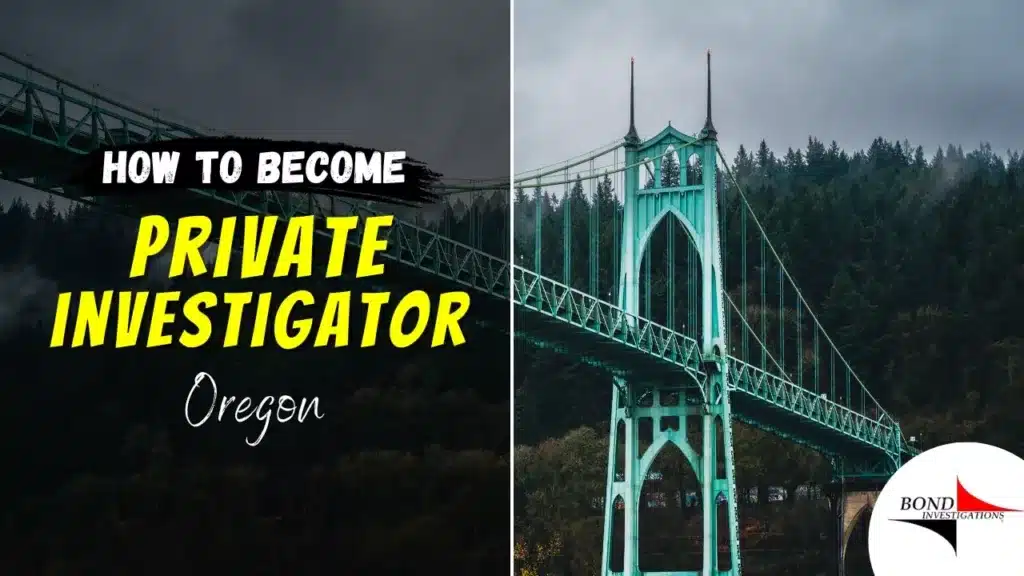Are you interested in becoming a private investigator in Oregon? Private investigation is a fascinating and rewarding career that requires a unique set of skills and training. In this article, we will discuss the steps you need to know about how to become a licensed private investigator in Oregon.

The first step to becoming a private investigator in Oregon is to obtain the necessary education and training. While there is no specific degree required, most private investigators have a background in criminal justice, law enforcement, or a related field. You can also enroll in a private investigator training program, which will provide you with the necessary knowledge and skills to succeed in this field. There are also many online resources available for free, such as webinars and tutorials, that can help you learn the basics of private investigation.
In order to work as a private detective, you must obtain a license from the Oregon Department of Public Safety Standards and Training (DPSST). To be eligible for a license, you must be at least 18 years old, have a high school diploma or equivalent, and pass a criminal background check. You must also complete a minimum of 150 hours of training, which includes 40 hours of classroom instruction and 110 hours of field training.
Field training is an essential part of becoming a private investigator in Oregon. During this training, you will work under the supervision of a licensed private investigator and gain hands-on experience in conducting investigations, gathering evidence, and writing reports. This training will also help you develop important skills such as surveillance, interviewing, and research.

Once you have obtained your license, it is important to continue your education and training to stay up-to-date with the latest techniques and technologies in the field of private investigation. The DPSST requires licensed private investigators to complete 32 hours of continuing education every two years. This can include attending conferences, workshops, or online courses.
While the basic training and education requirements are the same for all private investigators in Oregon, you may choose to specialize in a specific area of investigation. This can include fraud investigation, computer forensics, or missing persons investigations. Specialized training can help you stand out in the field and attract more clients.
Networking is an important aspect of any career, and it is especially important for private investigators. Building relationships with other private investigators, law enforcement officials, and attorneys can help you find job opportunities and gain valuable insights and advice. You can join professional organizations such as the Oregon Association of Licensed Investigators to connect with other professionals in the field.
By following these steps, you can become a licensed private investigator in Oregon and start a rewarding career in this exciting field. Remember to always stay updated on the latest techniques and laws, and continue to develop your skills through education and training. Good luck on your journey to becoming a private investigator in Oregon!
Interested in becoming a private investigator in Oregon for Bond Investigations? Visit our career page and submit an application.
Private investigation in Oregon requires a unique skill set and specific training. In this article, we outline the steps needed to become a licensed private investigator in Oregon.
While no specific degree is required, backgrounds in criminal justice, law enforcement, or related fields are common. Enrolling in a private investigator training program or utilizing online resources can provide essential knowledge and skills.
To work as a private investigator in Oregon, a license from the Oregon Department of Public Safety Standards and Training (DPSST) is necessary. Requirements include being 18 or older, holding a high school diploma or equivalent, passing a background check, and completing 150 hours of training.
Licensed investigators in Oregon must complete 32 hours of continuing education every two years to stay updated with industry techniques and technologies, attending workshops, conferences, or online courses.
By following the outlined steps, including staying updated on techniques and laws, continuing education, and enhancing skills, one can pursue a rewarding career in the field.
Those interested in a career with Bond Investigations in Oregon can visit the company’s career page and submit an application to explore opportunities in this exciting field.
While basic training remains consistent, specialization in fields like fraud investigation, computer forensics, or missing persons investigations can offer additional expertise and enhance career prospects.
Field training, conducted under a licensed investigator’s supervision, offers hands-on experience crucial for understanding investigative techniques, evidence collection, and report writing.
